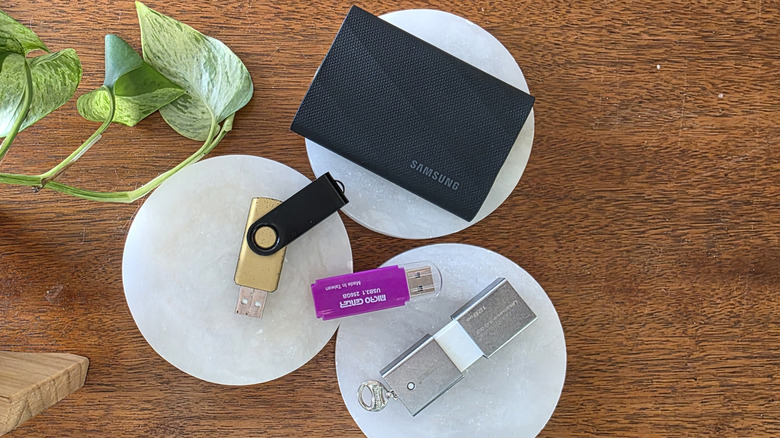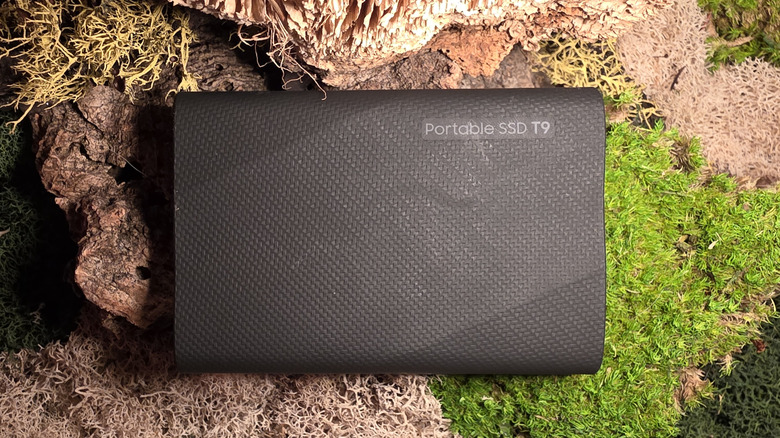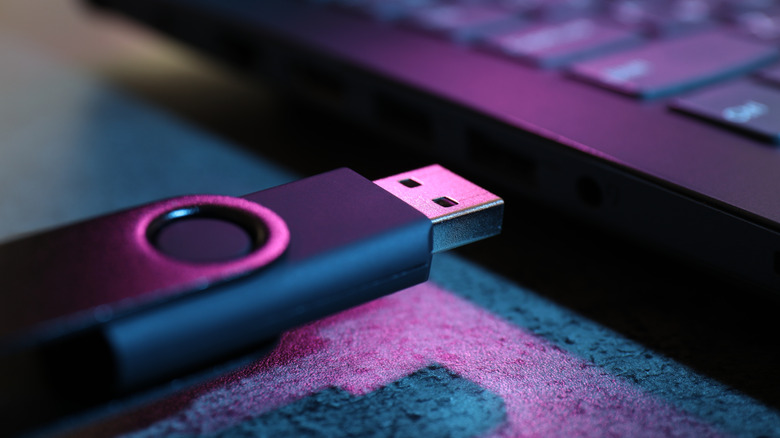Is It Safe To Keep Your Important Files On A USB Drive?
For many people, having a USB drive on hand is the most convenient way to store important files. It's as easy as plugging your drive into your computer and dragging the files over, which is why flash storage has become the most ubiquitous form of backup. Moreover, flash storage has been dirt cheap for a long time compared to other computer hardware, and with prices expected to rise in accordance with demand related to AI, now is the time to pick up thumb drives and SSDs. But is it really safe to keep important files on a USB drive, or is there a better solution?
First, let's be clear about what file safety means. When we talk about keeping files safe, we usually mean one of two things, both of which are important. Safety can mean preserving your files so they don't get destroyed or deleted, but it can also refer to protecting them from hackers, thieves, and other ne'er-do-wells. Either way, storing your important files on a USB drive is a lot like driving a car: it's never totally safe, but most people will rarely experience any issues if they follow a few simple rules.
Tradeoffs are always present when organizing your digital life, and the same is true of file safety. A single backup could be easily lost or destroyed, but the more backups you make, the more you risk someone gaining unauthorized access. So, while a USB drive isn't a bad way to store your most precious files, it's not the only thing you should rely on. Here's what you need to know to keep your documents protected.
Never keep your important files on a single drive
When it comes to USB drives, not all are created equal. The lifespan of a USB drive can be determined by the quality of its manufacturing, how often data is written to it, and several other factors. In terms of quality, there's a difference between a flash drive you bought for a few bucks on Amazon and a rugged SSD that costs hundreds. Either way, though, you shouldn't rely on a single drive to back up your files. Yes, the cheap flash drive has a higher chance of failure, but even expensive ones can crap out unexpectedly — which is why we've recommended avoiding a particular SanDisk drive sold by Costco and other retailers.
Regardless of quality, all flash drives are vulnerable to malware. Once connected to an infected computer, some viruses can hitch a ride on your flash drive to infect other computers you connect to in the future. In some cases, hackers will hold your files for ransom. The more valuable the file, the more cash or data they might try to squeeze out of you. Malware is also one reason you should avoid buying used USB flash drives.
The key to file preservation is redundancy. You should always keep multiple copies. Instead of a single USB drive, consider backing your irreplaceable files up on multiple storage devices. You can make redundant backups using either cloud or local storage, but both have trade-offs. One popular local solution is RAID (Redundant Array of Independent Disks), where files are backed up across multiple other hard drives connected to a computer system. Cloud storage is easier to set up using services like Google Drive or Dropbox, but is more vulnerable to hacking since it's only protected by a username and password.
Security is as important as redundancy for file safety
In terms of security, keeping your files on a USB drive isn't the worst idea. When disconnected from a computer, the files on USB drives cannot be accessed remotely. A malicious actor would need to physically steal the drive from you. However, in the event that it were stolen, the files would be unprotected.
If you're worried about theft, you can encrypt a USB drive using BitLocker on Windows systems or Disk Utility on MacOS. This will add a layer of password-protected security to the drive, deterring all but the most tech savvy thieves from accessing the files in the event the drive is lost or stolen. And, of course, you can do things to protect local drives that you could never do with digital storage: stick them in a jewelry safe or a bank safety deposit box, for instance.
As mentioned, multiple backups are key, and most people should create at least two backups of their data. Unless you're charged with highly guarded company or state secrets, a good solution is to keep your important files backed up both locally and in the cloud. If your cloud storage gets hacked, you'll have the physical USB drive to fall back on, and vice versa if you lose the drive. Those with more sensitive security needs should invest in a robust local backup system with high-grade encryption.
Lastly, many experts recommend practicing for a data loss scenario. Play out the scenario of losing your files, then test whether your system can save you. If your data gets erased or lost for real, you need to be confident in recovering it. That peace of mind is what we're really after.


